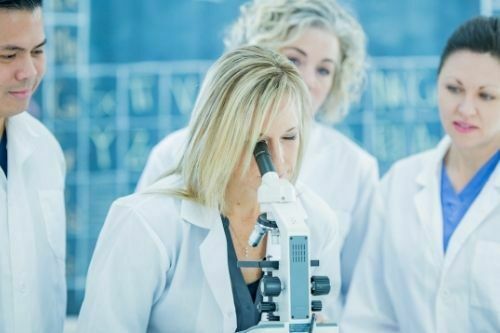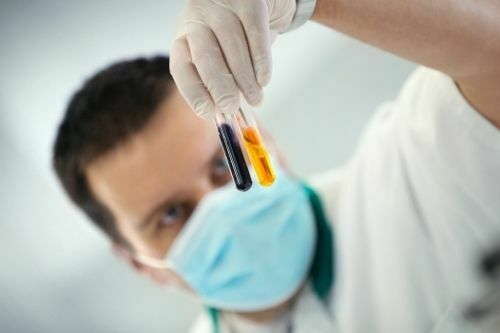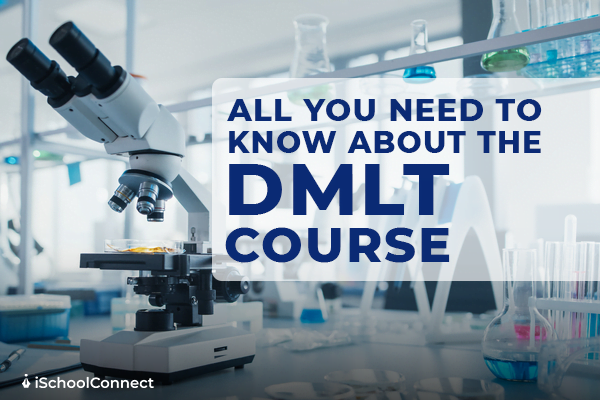Table of Contents
- DMLT course | What is it?
- What is medical laboratory technology?
- What is a medical laboratory technician’s job?
- Who can apply to the medical laboratory technology program?
- DMLT course details and curriculum
- DMLT course structure
- Teaching methodologies and techniques for the DMLT course
- Skills required to pursue the DMLT course
- DMLT course | Job prospects
- Scope for higher education after DMLT course
- Key takeaways
- FAQs
DMLT course | What is it?
The DMLT (Diploma in Medical Laboratory Technology) course is a two-year diploma program that focuses on using clinical laboratory testing to diagnose, treat, and prevent disease. A medical laboratory technologist (also known as a medical technologist) checks the fluids, tissues, blood types, microbiological screening, chemical analysis, and cell counts of the human body.
If you want to learn more about this course, look no further. We covered everything from the course structure to the job responsibilities after completing the course. Keep scrolling!
What is medical laboratory technology?
Medical laboratory technology is a subfield of paramedical science. It focuses on the biochemical, pathological, and microscopic examination of the body’s cells. It also includes the evaluation of tissues. Therefore, the course provides knowledge to aid professionals in developing a treatment plan.
What is a medical laboratory technician’s job?
A skilled technologist performs a variety of clinical tests as well as operates exceedingly complicated and sophisticated processes. Medical lab technicians are in charge of the following duties-
- Conducting processes for the extraction of body fluid samples, as well as their evaluation and analysis.
- Examining various body tissues, sample collection and preparation, and microscopic examination.
- Evaluating various blood cells and identifying alterations or diseases in them.
- Conducting biochemistry tests to determine blood composition, hormones, enzymes, and drug levels.
- In the event of an emergency or trauma, blood grouping and crossmatching are performed.
- Lastly, microbiological detection of numerous infections that cause illnesses and damage the human body. These pathogens include viruses, bacteria, and others.

Who can apply to the medical laboratory technology program?
Aspirants who want to work in the medical field might consider pursuing a lab technician course. Therefore, this program is for anybody interested in learning the different methods to assist healthcare professionals and improve people’s health.
DMLT course details and curriculum
The course curriculum is developed in such a manner that students are entirely transformed into responsible professionals by the end of the course. This course curriculum helps students gain the skills and abilities required to apply basic science concepts in everyday practice. This allows technicians to do their routine responsibilities with professionalism and integrity.
The following are the main subjects covered in the course-
- Pathology
- Parasitology
- Clinical Chemistry
- Clinical Biochemistry
- Ultrasonography
- Molecular Biology and Applied Genetics
- Coagulation
- Hematology
- Cytotechnology
- Radiology
- Electron Microscopy
- Clinical Pathology
- Microbiology
- Biomedical Techniques
- Immunology and Immunological Techniques
- Biostatics
- Bacteriology
- Anatomy
- Physiology
- Biochemistry
- Medical Ethics & Communication for Healthcare Professionals
- Administration & Training in Hospitals
- Histocytology
- Biomedical Procedures
- Medical Diagnostics
- Laboratory management
DMLT course structure
The DMLT course framework includes both core and optional courses. It is a two-year program organized into four semesters. In addition, students can participate in practical sessions to gain hands-on experience that will help them strengthen their academic understanding. A research project is offered to students at the end of the fourth semester so that they can have both practical and theoretical skills to thrive in this field.
The following is the course outline-
- IV semesters
- Core subjects
- Elective subjects
- Practical workshops
- Project/thesis submission
Teaching methodologies and techniques for the DMLT course
The DMLT course curriculum takes into account the many procedures used in the medical industry as technology advances. In recent years, medical professionals have relied on digital learning and hands-on experience with the equipment in their hospitals and laboratories.
The following are some general teaching methodologies-
- Seminars
- Group projects
- Digital learning
- Traditional classroom-based teaching
- Practical lab sessions
- Self-directed learning

Skills required to pursue the DMLT course
Candidates for the DMLT program should be well versed in their computer skills as well as their critical thinking abilities. They should also be able to quickly operate equipment and develop new ways to make specimens. The following are some necessary skills for DMLT graduates-
- Equipment calibration
- Troubleshooting
- Maintenance
- Programming
- Critical thinking
- Problem-solving
- Time management
- Computer skills
DMLT course | Job prospects
The DMLT course graduates have a wide range of job opportunities. Since colleges provide students with the information and skills, they can choose from a variety of career opportunities, including-
- MRI Technician
- CT scan Technicians
- X-Ray Technician
- Operation Theater Technician
- Pathology Technician
- Physiotherapy Technician
- Dental Machine Technician
- Optical Laboratory Technician
- Radiology Technician
- Renal Dialysis Technician

Scope for higher education after DMLT course
Medical Laboratory Technicians are in high demand in various government and private entities. Moreover, students who have completed the DMLT course might pursue higher education in the same profession or a specialized area. Some of the higher education opportunities available to students are-
- BA in Medical Laboratory Technology
- M.Sc in Medical Laboratory Technology
- M.Sc in Medical Laboratory Technology
- Postgraduate Diploma in Laboratory Services
Key takeaways
- DMLT courses can help you further your career in both the public and private sectors.
- The courses also include a wide range of specialist subjects in medicine.
- It provides students with knowledge that will aid professionals in developing a treatment plan.
- Medical laboratory technology is designed for students to gain hands-on experience, practical knowledge, and insight into dealing with patients immediately after completing the course.
- Moreover, the training prepares you for a variety of careers in the medical field.
- Today, DMLT-educated technologists/technicians do more than half of all medical diagnostics in laboratories.
We hope you found this blog post to be informative and helpful. In case of any doubts, reach out to us or drop a comment below!
Liked this blog? Read next: Medical courses after 12th | Top 7 courses you must think about
FAQs
Q1. Do I need Physics to pursue a DMLT course?
Answer – In order to apply for the DMLT B.Sc integrated program, you must pass the 10+2 examination from a recognized board or institution in the Science stream. Additionally, your primary subjects should be Physics, Chemistry, and Biology.
Q2. Is it required that I hold a bachelor’s degree in order to pursue DMLT?
Answer – The DMLT program does not require a bachelor’s degree. For a DMLT program, candidates must have completed their 12th grade with a minimum of 45% in the Science field.
Q3. Can I open my lab after completing DMLT?
Answer – DMLT holders cannot run a pathology lab on their own. However, according to the Indian Medical Council’s rules, you can start a DMLT lab with an MBBS/MD degree.






